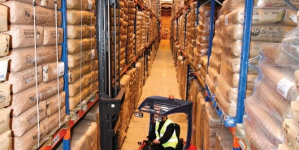-
GOPLASTICPALLETS.COM AND GOMI TEAM UP TO CREATEINNOVATIVE TECH FROM END-OF-LIFE PALLETS - 22 hours ago
-
Nulogy Introduces the Manufacturing Operating System - February 27, 2026
-
Bliss Direct scales to 300 daily orders and saves 25 hours per week with Forterro’s Orderwise ERP - February 25, 2026
-
Wootzwork raises $6.6M to bring predictability to offshore manufacturing - February 25, 2026
-
Rite-Hite unveils new range of hydraulic kits to upgrade and extend dock leveller performance - February 19, 2026
-
REWE and Cimcorp automate fresh supply chain for Berlin supermarkets and stores - February 19, 2026
-
Q1 – A recovery period or time to fix, switch and scale? - February 19, 2026
-
NULOGY’S SHOP FLOOR SOFTWARE TO POWER COMPLETE CO-PACKING’SOPERATIONS - February 13, 2026
-
Why lead generation depends upon good content - February 13, 2026
-
Wallapop and Albatross Sign Strategic Partnership to Bring Real-Time AI Discovery to the Future of Consumer-to-Consumer Commerce - February 12, 2026
It’s time to rethink the way we use wooden pallets across global supply chains.
Every object in the world is, at some time or another, carried on a wooden pallet. As a result, pallets have become arguably as integral to global trade as containers.
The humble pallet’s rise and rise can be traced back to the late 1930s when the development of the first forklift trucks enabled goods to be moved, stacked and stored with greater speed than ever.
But, the pallet really emerged as a revolutionary storage and materials handling tool during the second World War, when a US Navy Supply Corps officer called Norman Cahners invented the ‘four-way pallet.’
By cutting notches in the pallet’s side to enable forklifts to pick them up from any direction, Cahners effectively doubled material-handling throughput speeds.
Wooden pallet design has remained more or less unchanged since Norman Cahners’ relatively minor refinement, and now there are literally billions in circulation in the global supply chain.
There are an estimated two billion in the United States alone and, such is the US economy’s reliance on the wooden pallet, that it is reckoned that pallet production accounts for more than 40 percent of the United States’ total annual hardwood lumber production.
With about 500 million pallets made each year in the US to replace those that are discarded because they have become worn or damaged, it has been said that it requires enough wood to cover an area 10 times the size of New York city to replace those that end up in US landfill sites every year. So, it is perhaps not a surprise that some environmental groups see wooden pallets as a major waste of resources.
But now a new forklift truck attachment is available that dramatically slashes the damage caused to pallets – and, therefore has the ability to extend a pallet’s working life.
In simple terms, the attachment, known as a Sumo Glove, is fitted to the tips of a lift truck’s forks to provide a protective cover that limits the impact of a carelessly driven forklift’s forks against a load.
Made from industrial grade polyurethane, essentially, the Sumo Glove works as a pad that reduces a fork’s impact against a pallet during the pallet put away or picking process.
Importantly, the Gloves – which are quickly and easily fitted and are compatible with all common makes and size of lift truck – reduce load damage without affecting the operational effectiveness of the forklift.
They have been deployed by a number of global companies at numerous sites across the USA with outstanding damage reduction results.
“We obviously need pallets in the supply chain but, because of the large number that are damaged and discarded each year, a shift in the way that we think and act regarding the use of wooden pallets across supply chains is required,” says Simon Ross, principal of the Sumo Glove’s manufacturer, UK-based Sumo Industrial & Allied Products Marketing Ltd.
He adds: “Wooden pallet production has become a major factor in the planet’s deforestation. Of course, some might argue that wood is a relatively cheap and renewable resource, but waste on this scale is hard to justify – particularly when any company that uses forklift trucks to move palletized loads at any stage of their journey through the supply chain, can reduce wooden pallet damage with the introduction of such a simple and inexpensive product as the Sumo Glove.”
And, of course, Sumo Gloves protect the load too, as Simon Ross explains: “Forklift related product damage is a concern at many sites around the world and businesses are under greater pressure than ever before to drive costs out of their intralogistics processes. At one major manufacturer Sumo Gloves cut the amount of product damage caused by carelessly driven forklifts by over 98 per cent.”
Sumo Gloves are available in the US through BWS Industrial Services Inc and distributors are sought for other territories. For more information please visit: www.sumoglove.us

































